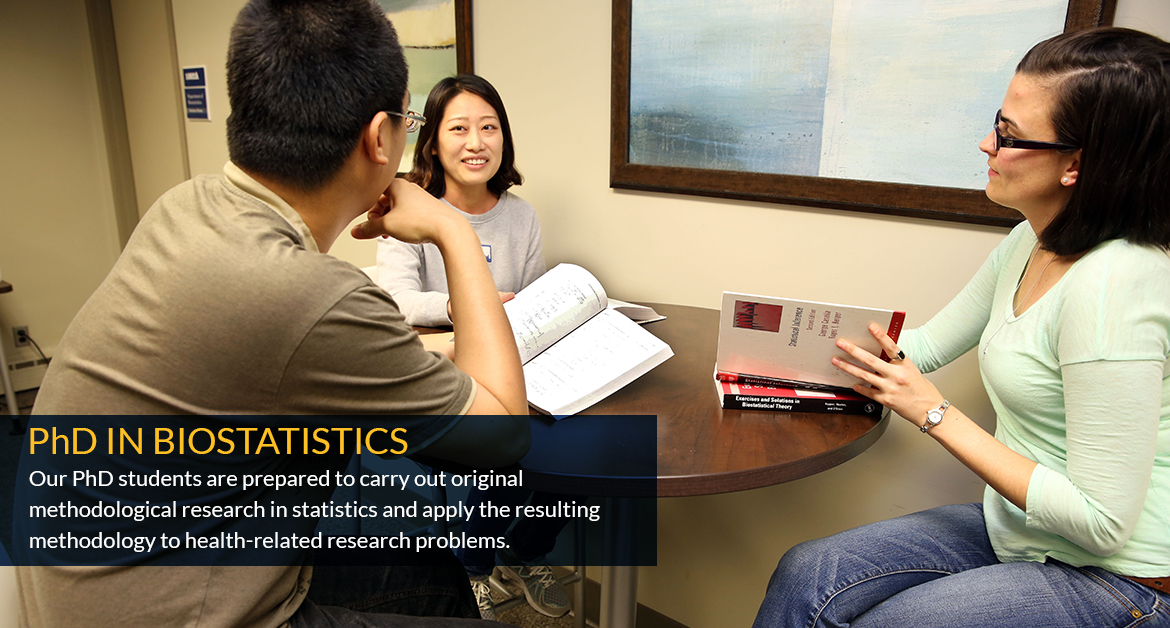
The doctoral degree (PhD) in Biostatistics prepares individuals to understand the mathematical and theoretical basis of statistical methodology; collaborate on the design of research studies in the health sciences; provide advice on the proper collection, entry, storage, retrieval, and manipulation of data; and take primary responsibility for the analysis, interpretation, and dissemination of data in a research study using state-of-the-art statistical methods and software. PhD students are also prepared to carry out original methodological research in statistics and apply the resulting methodology to health-related research problems.
General Information
The PhD program curriculum includes
Funding for PhD Students
We offer a Graduate Research Assistantship to competitive PhD students that consist:
Graduate Research Assistants provide statistical consulting support as well as methodological and statistical work with their mentor to gain practical application and methodological development skills on real-world applications of biostatistics in the health sciences.
Check out a complete sample list of the courses and course descriptions.
|
Year |
Fall |
Spring |
Summer |
|
1 |
STAT 7110 – Statistical Models and Methods (3) STAT 7520 – Stat Theory I (3) DATS 7510 –Programming for Data Analysis (3) BIOM 8011 – RCR (1) |
STAT 7630 – Applied Linear Models (3) STAT 7620 – Stat Theory II (3) Elective (3) Elective (3) |
No summer courses are required. Enrolling in Stat 8890 RR Is optional (without summer funding). Year 1: 16 hrs core, 6 hrs elect |
|
2 |
STAT 9220 Advanced Stat Inference (3) or STAT 9120 – Theory of Linear Models (3) STAT 7640 – Gen Linear Models I (3) STAT 7720 Survival Analysis (3) STAT 7870 – Biostat Consulting Research (3) |
STAT 9140 -Gen Linear Models II (3) or STAT 9240 – Bayesian Inference (3) DATS 8170 – Advanced Comp Methods (3) Elective (3) Elective (3) |
No summer courses are required. Enrolling in Stat 8890 RR Is optional (without summer funding). Year 2: 18 hrs core, 6 hrs elect |
|
3 |
STAT 9220 Advanced Stat Inference (3) or STAT 9120 – Theory of Linear Models (3) Elective (3) Electives (3) STAT 8890 – RR (3) 1st attempt Comp Exam: 1st and 2nd wks in fall. 2nd attempt: 2 wks before end of the fall semester. |
STAT 9140 – Gen Linear Models II (3) or STAT 9240 – Bayesian Inference (3) Elective (3) STAT 8890 – RR (6) |
No summer courses are required. Enrolling in Stat 8890 RR is optional (without summer funding). Year 3: 6 hrs core, 9 hrs. elect, 9 RR
|
|
4 |
STAT 8890 – RR (9-12) Proposal due (1st attempt) |
STAT 9300 –Dissertation Res (DS) [Enrollment in 9300 requires a pass of the Proposal] (9) or STAT 8890 RR (9) Proposal due (2nd attempt) |
STAT 9300 – DS (12) Year 4: 9 - 21 hrs RR, 12-21 hrs DS
|
|
5 |
STAT 9300 – DS (12) |
STAT 9300 – DS (12)
|
STAT 9300 – DS (12) Year 5: 24 - 36 hrs DS
|
Notes:
Suggested Elective Courses (21 credit hours with at least 6 credit hours at the 8000-level or above with prefix STAT or DAT)
For more information on the course pre-requisites and other requirements for
applying to the PhD program in Biostatistics, see our Prospective Students page.